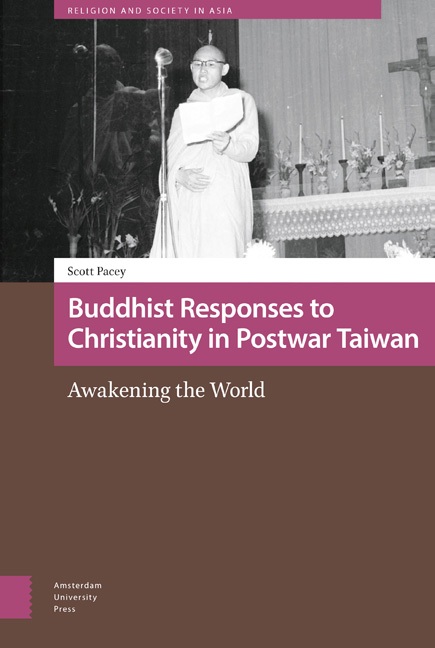Book contents
1 - Buddhism and Patriotism
Published online by Cambridge University Press: 21 November 2020
Summary
Abstract
The KMT sought to foster one value in particular—that of patriotism, or loyalty to the Republic of China. In this context, the elite Buddhists covered in this chapter presented Buddhism as patriotic, and aligned with the “modern” Chinese values promoted in the post-war context. On the other hand, they presented Christianity as antithetical to these. Such a stance painted Christianity as inherently unpatriotic, and therefore discordant with the KMT's socio-political vision. Interfaith competition thus allowed these Buddhists to craft, and express, a politically acceptable identity. The chapter examines these issues through the writings of two Buddhist figures: Zhuyun and Shengyan (then writing as “The General who Awakens the World”), and a Christian pastor, Wu Enpu.
Keywords: Zhuyun, Wu Enpu, the General who Awakens the World, Jesus, the Buddha
The Buddhist canon is large and its contents are highly varied. A widely used edition for scholars of Chinese Buddhism is the Taishō Tripitaka. This was originally published in 55-volumes in the 1920s in Japan, and encompasses a diverse array of teachings that developed throughout the Buddhist world over time. When the Chinese began receiving Buddhist sutras and commentaries from the Indic cultural sphere in the first century, they had trouble reconciling this diversity and difference. Attempts to systematically arrange and make sense of the multitude of texts led to the rise of the Chinese schools of Buddhism, but crucially, this great diversity means there is no widespread agreement over which of them are the most important. In contrast, although a number of Bible translations circulated in China in the nineteenth century, in the twentieth century, it was the Protestant Union Version that predominated. Therefore, while Christians had a standard, portable set of scriptures they could use when proselytizing, Buddhists seeking a missionizing tool faced challenges over the choice of texts to disseminate, and how to render them in a convenient format.
To resolve this conundrum, in 1957 the Buddhist laywoman Yang Xiuhe published the Buddhist Bible (Fojiao shengjing) in Taiwan. Yang's volume in fact follows on from earlier efforts, elsewhere in the Buddhist world, to compile a concise statement of Buddhist teachings.
- Type
- Chapter
- Information
- Buddhist Responses to Christianity in Postwar TaiwanAwakening the World, pp. 57 - 88Publisher: Amsterdam University PressPrint publication year: 2019



